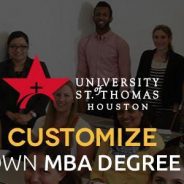Search results for :
The Best Dallas Consulting And Strategic Management MBAs
Year after year, consulting and strategic management careers are a top draw for MBA students. In fact, 41 percent of millennials and 27 percent of Generation X MBA candidates place a job in consulting services or management consultation as their first choice, according to the 2015 Prospective Student Survey conducted by the Graduate Management Admissions Council (GMAC).
A few reasons for this attraction to consulting and strategic management are the prestigious firms such as Boston Consulting Group that hire MBAs as well as the starting salaries. According to Management Consulted, MBAs that go into consulting can expect to earn between $110,000 to $140,000 for a base with a signing bonus between $20,000 and $40,000 and a year-end bonus of another $20,000 to $40,000.
There is one issue because consulting is such a sought after career field for MBAs it can be incredibly competitive. That’s why it’s important to go to the right school that offers a best-in-class education for consulting and has a track record of success. For MBA candidates in the Dallas area, the following schools are your best options for a consulting and strategic management MBA. Continue reading…
How Wharton Prepares MBA Graduates For The Workforce
Going back to business school to pursue an MBA is an important step to getting that high-paying dream job. However, the path to graduation and employment can be a little overwhelming for some. In order help students out and ultimately increase their likelihood of being hired post-grad, schools prepare their students for various careers and industries through internship programs, career services and counseling, hands-on projects and sprawling alumni networks.
Admissions Tip: Volunteer Experience
It’s the time of year when MBA applicants aiming for fall 2018 intake are beginning to think about the admissions process, which is why we wanted to focus this week’s admissions tip on one element of the application that candidates often underestimate: volunteer experience.
In order to understand why this category is important, candidates should keep in mind that the adcom is responsible for crafting a dynamic class each year. The aim is to admit individuals who will support a vibrant campus community and step into leadership positions. In other words, as admissions officers consider each applicant, they ask themselves “what’s in it for our school?” An applicant who has previously demonstrated a talent for writing, for example, by contributing to a nonprofit’s newsletter, will really catch the adcom’s attention if she also expresses her intent to contribute to a specific publication on campus.
Schools are also interested in admitting well-rounded candidates, not simply candidates that have performed well at work and in their academics, but have expanded their involvement in other activities. They seek students with good values and those who volunteer in their community demonstrate their good citizenship.
Volunteering is of course a great way to expand one’s extracurricular involvement. While, many applicants participate in the occasional fundraising walk or an annual corporate outreach day; those who demonstrate ongoing involvement in one cause or organization will be of special interest to the admissions committee, especially if it is related to their current or future career. A candidate who has contributed over a longer period is likely to have developed his or her responsibilities beyond ladling soup or stuffing envelopes. What’s more, this can be a particularly important opportunity for applicants who are currently living and working outside of their home countries; for example, an Indian applicant who works and volunteers in Africa will stand out as being particularly engaged and well adapted to his or her foreign environment.
It is also important to be involved in something about which you are passionate. Passion will help in a couple of ways, it will mean that you will commit more time to the endeavor, it will also mean that you will be more likely to take on a leadership role. Thus, if you are passionate about animal welfare then volunteering at an animal shelter, or lobbying in Washington, DC to help shape future legislation, will be far more interesting to the adcom than if you intermittently volunteer at a soup kitchen.
Candidates who are older or younger than the average applicant should recognize that their extracurricular involvement is particularly important. A younger applicant who lacks leadership responsibilities at work might demonstrate his talent for motivating others outside of the office. Meanwhile, older applicants can use their extracurricular involvement to reassure the adcom that, despite family responsibilities or distance in age from one’s classmates, the broader life of the community remains important to them.
The majority of candidates who apply to top schools are admissible, they have good work experience and strong academic numbers. Oftentimes it is what they do during their volunteer experiences and extra-curricular activities that help separate strong applicants. If you feel this aspect of your candidacy is relatively weak, then increase your involvement now. While it is never too late, you should also recognize that the adcom will be skeptical of a candidate who has no tradition for volunteering, but starts 6 months before the application is due. Remember that it is important that your volunteer work appears to be genuine.
Lastly, applicants will have a much easier time writing their application essays if they have a variety of experiences from which to draw. While applicants can certainly respond to most essay prompts by reflecting on their professional experiences, relying exclusively on one’s work is a mistake. With each essay, the applicant should aim to share a different side of him or herself—submitting five essays about electrical engineering or investment banking is not the most effective way to do this.
We hope that this sheds some light on the opportunities and value that activities outside of work provide with respect to one’s b-school candidacy and applications.
This article has been edited and republished with permissions from Clear Admit.
Want To Become A Budget Analyst? How An MBA Can Help
Managing a budget can sometimes be a difficult task—even when it comes to your personal finances. It’s no surprise, then, that large companies require skilled individuals to analyze, manage and make important decisions based on finances. That’s where a budget analyst comes in.
Texas A&M Foundation Recognizes Mays Philanthropists
The Texas A&M Foundation Board of Trustees at the Texas A&M University – Mays Business School recently announced the recipients of the foundation’s highest honor, the Sterling C. Evans Medal.
McCombs Donations Create New Opportunities
Two recent donations to UT Austin’s McCombs School of Business totaling $7 million promise to open up new opportunities for students and professors in marketing and real estate. In both cases, the gifts will be used to improve the school and advance its programming. Continue reading…
Financial Times Reveals Top Finance MBAs for 2017
The business end of business school has become a great cause of concern, particularly since the bubble burst in ‘08. MBAs need to be more technically adept and more comprehensively schooled to remain competitive in the financial services industry. As is the case with any major investment, the question is always how to get the most bang for one’s buck from whatever opportunity’s in play.
How UCLA Anderson Is Building Its Startup Community
Startups are booming in Los Angeles. Droves of venture capitalist from Northern California are now heading down south in search of better deals and new technology. According to CB Insights, around $3.5 billion in funding was poured into the LA area in 2016, a 25 percent increase from 2015. In fact, The Economist reveals that Los Angeles is now the third-most-prominent outpost for startups in America. So, it’s no wonder that Los Angeles universities are crafting their education with an eye toward entrepreneurship and the startup culture.
The UCLA Anderson School of Management is a great example of what it means to create a startup culture on campus. Entrepreneurship is intricately woven into the curriculum and opportunities on campus in such a way that it’s a vital part of the school. So, it’s no wonder that UCLA alumni are responsible for companies like Crazy Cart XL, Neural Analytics, BodySpec, Sugarfina, and more. And at the epicenter is the Price Center for Entrepreneurship & Innovation.
Price Center for Entrepreneurship & Innovation
The Price Center is the recognized leader in entrepreneurial education and research at the Anderson School. It’s a place where students, professors, and budding entrepreneurs can collaborate, practice entrepreneurship, and delve into business innovation. The Center provides a challenging interdisciplinary curriculum for students alongside real-world business experience to encourage new ideas and embrace the entrepreneurial vision. It’s also home to not only one of the largest clubs on campus (Entrepreneur Association), but the 10,000 square foot Anderson Venture Accelerator.
Anderson Venture Accelerator
The Anderson Venture Accelerator is a state-of-the-art facility that encourages students, faculty, and alumni to develop new business concepts together. It’s a multidisciplinary collaboration between students, entrepreneurs, campus researchers, alumni and the business community. It’s part living room, part laboratory and part conference center.
“The UCLA Anderson Venture Accelerator offers students and researchers an environment that triggers innovation and breakthrough ventures,” explained UCLA Anderson Dean Judy Olian. “It brings together students and faculty from across UCLA, including the health and computer sciences, engineering and the humanities to develop new ventures.”
Entrepreneur Association
As for the Entrepreneur Association, it has more than 600 members, making it among the largest student organizations on campus. Members can attend more than 100 events each year, averaging three per week, including networking events, hands-on workshops, world-class business plan competitions, conferences and more. As an example:
- Dinners for Eight: This program brings eight students into an intimate setting so they can get to know accomplished entrepreneurs and fellow students over dinner.
- Entrepreneurial Leaders Roundtable: This event welcomes a group of successful leaders below the age of 40, and allows students to network and get the inside track on running a company.
And for students who want to take the entrepreneurial track in a more competitive direction, there’s the Knapp Venture Competition.
Knapp Venture Competition
Now in its 36th year, the Knapp Venture Competition is one of the premier business plan competitions in Southern California. Students from across UCLA Anderson attend to showcase their talents and to participate in a unique venture creation experience that has been instrumental in launching numerous businesses. It’s a competition that is not just about gaining funding, but also about gaining advice and insight from successful entrepreneurs and business executives.
But it’s not just the co-curricular activities that make UCLA Anderson an entrepreneurial gold mine; it’s also the curriculum. For example, the MBA program offers students a chance to specialize in entrepreneurship by completing four courses.
Entrepreneurship Curriculum
At UCLA Anderson, classes dedicated to entrepreneurship can be specialized or general, depending on the student’s needs and wants. The various entrepreneurial course offerings at UCLA Anderson provide students with knowledge and perspective about the entrepreneurial process. Students will develop strategies to generate market interest, and simultaneously learn how to manage organization operations, transitions, and growth. Some courses include:
- Business Plan Development
- Business Law for Managers & Entrepreneurs
- Entrepreneurship & Venture Initiation
- Financing and Emerging Enterprise
- Managing Entrepreneurial Organizations
- Venture Capital & Private Equity
And these classes are all taught by area specialists and faculty who have distinguished themselves as business professionals. As an example, Daniel A. Nathanson is a Visiting Assistant Professor who teaches Business Plan Development. His background includes being the founder and CEO of Computerized Retail Systems (CRS), a turnkey, point-of-sale computer company that became a leader in its field. He’s also the founder and CEO of Washington Square Capital Fund (WSCF), a formalized angel group that invests in early-stage companies. Both of these experiences make him an invaluable resource for students, and he is just one example of the quality faculty at UCLA Anderson.
No matter you’re entrepreneurial interest at UCLA Anderson, there’s sure to be an opportunity, a class, a professor, or a business that fits your needs and wants.
NYU Stern Launches New Tech and Fashion & Luxury MBAs
INSEAD, watch out. New York University Stern School of Business is getting into the one-year MBA game—and leveraging its New York City location in a major way. Stern announced yesterday that it will launch two new May-to-May MBA programs, one in tech and a second in fashion and luxury. In just 12 months, students in these programs will complete a foundational business core, a specialty area core, and electives. Along the way, they will work on real-life business projects for companies in tech or fashion and luxury respectively, gaining the experience and building the relationships that will land them jobs when they’re done.
Continue reading…
Want To Be A Hospital Administrator? An MBA Can Help.
The idea of a hospital may be especially foreboding for some, but for many others it represents endless opportunity, along with a true chance to help those in need. And while a hospital typically is seen as a home to medical personnel such as doctors and nurses, such facilities simply couldn’t run without the help of someone with the skills to organize, manage and efficiently operate such a complex and interdisciplinary workplace.
Continue reading…
Imperial MBA Exchange Program Offers Unique Interview Opportunities
There’s no doubt that top tier MBA programs are about more than just coursework, they’re also about the experience. As part of that, Imperial College Business School At Imperial College London offers its MBA students a chance to participate in the Imperial MBA exchange program. Most recently, Teodor Hlihor (’17 MBA) had the opportunity to study at the University of St. Gallen in Switzerland. During that experience, he was able to interview Stefan Loacker, the previous CEO of Helvetia Insurance. Continue reading…
New Jindal Healthcare Leadership and Management Center Debuts
The newly formed Center for Healthcare Leadership and Management debuted April 20th, uniting the health care management programs at the University of Texas at Dallas – Naveen Jindal School of Management.
University of St. Thomas Launches MBA Degree Plan Builder
Sponsored Content
Choosing an MBA degree just got a lot easier for prospective applicants to the Cameron School of Business at the University of St. Thomas in Houston, Texas. The school has formally announced its brand new MBABuilder™, which allows a new level of personal customization that few other MBA programs can match.
An Online MBA Or Full-Time MBA: What Should You Pursue?
Applying for and pursuing an MBA degree can be an overwhelming process—one that begins long before your first day of classes. Even if you’ve narrowed down a metro and business school, most schools offer a number of diverse MBA options, offering students the chance to choose the MBA program that fits best into their life.
Most business schools acknowledge that their students have busy professional lives outside of school, and provide options such as part-time or Online MBAs to ensure that they needn’t put their careers on hold while they pursue their degree. Still, with online degree programs a somewhat new offering in education, many prospective students wonder if they might miss something by not pursuing the traditional MBA in the classroom.
Choosing to pursue an MBA online or in a classroom setting may come down to many factors, from cost to career path to individual learning style. Nevertheless, figuring out which one is just right for you is not always a straightforward task. Here, we compare the various benefits of each program to help you decide which style is right for you:
An Online MBA Or Full-Time MBA: What Should You Pursue?
The Full-Time MBA
While there are many benefits to the online MBA—discussed below—many students still choose to earn a traditional full-time MBA in the classroom. There may be a number of reasons why a student would choose this option, most which deal with their particular learning style. For one, pursuing an online MBA takes a great deal of self-motivation and discipline, especially without the structure of a classroom to keep students on course when it comes to deadlines and effort. If a student knows that they struggle with time management and self-discipline, a traditional MBA may be the better choice for them as the classroom setting provides an inherent structure to the program that an online MBA often lacks.
Online classes also typically require a high level of class participation, to ensure that students at home don’t lose focus and stay engaged. Prospective students who are less likely to be engaged in a classroom may find it even more difficult to keep up in a setting where they are more distanced from their classmates or faculty. A traditional MBA may be better for students who need the direct and immediate response that a classroom setting can provide.
Finally, while employer perception of online MBAs has been changing in recent years, there are still many critics of online degrees, and in the past data has shown graduates of online degrees may not increase their salaries as significantly post-MBA as full-time students. Though this has changed in recent years, many students still have concerns about online education and its perception by employers. A recent LearningHouse study found that 27 percent of online students voiced concerns about employer’s perceptions of online study. The same number named their biggest concern as issues of motivation and attentiveness. If you think concerns such as these might interfere with an effective learning process, opting for a full-time traditional degree may allay any anxiety about the online approach.
The Online MBA
If the common concerns of perception and motivation aren’t on your mind, you may want to consider the many benefits of earning an online MBA—chief among them is the flexibility that goes along with an online program. Students pursuing online degrees don’t need to put their careers on hold as they pursue an advanced education, and maintaining a career and school simultaneously demonstrates a level of commitment that can be very appealing to prospective employers. And while the cost of some online degrees are often similar to their in-classroom counterpart, the addition of two years of lost salary with a full-time degree can make the total cost far greater than a degree online. Another benefit is the fact that many online MBA programs do not require students to take the GMAT or GRE, which can save a tremendous amount of time, money, and anxiety for those who struggle with test-taking.
While some issues of perception may remain, a U.S. News & World Report study showed roughly 71.4 percent of academic leaders saw online learning as comparable or even superior to traditional classes when it comes to the skills and knowledge students obtain. The other thirty percent should pay attention to the numbers coming out from many programs throughout the country. At the Southeast Missouri State University, for example, the AACSB accredited online MBA produces job acceptance rates of 98 percent for students within just one year of graduation.
The Online MBA is designed to be flexible on all levels, even the amount of overall time it will take to complete the degree. While full-time MBA programs traditionally take two years to complete, many Online MBAs can be completed in as little as 16-months. Students with a busier schedule may choose to extend the amount of time they need to complete the degree.
Which One is Right for You?
Deciding which type of degree is best for you is a personal decision that involves a multitude of intersecting factors. Regardless of which path you choose, employers need for MBAs doesn’t look like it’s decreasing any time soon—in 2016 roughly 88 percent of corporate recruiters said they planned to hire MBA grads, an increase of 8 percent from the prior year. The need for well-educated business leaders is always increasing, and choosing the best way to effectively and affordably earn your degree is not just a benefit for the student, but for the business community at large.
Two Georgetown McDonough MBAs Win Tech Case Competition
Two full-time MBA students from Georgetown’s McDonough School of Business recently won the top prize in the sixth annual MBA Technology Innovation Case Competition, taking home $6,250 in total prize money. Anne Laughlin (MBA’17) and Nicholas Lamp (MBA’17) competed against and defeated teams from John Hopkins University, University of Notre Dame and George Washington University. Continue reading…
MBA Admissions Tip: Going Beyond School Websites
As the 2016-17 MBA application season draws to a close, we now turn our attention towards admissions advice for those targeting 2018 entrance to business school. To celebrate this move, we are hosting a series of 10 chats that will be hosted on alternating Wednesdays at 10 a.m., beginning this Wednesday, May 10th. In the meantime, for today’s admissions tip, we focus on how to reach out to the b-schools in which you are interested beyond just visiting the school websites.
Communicating with b-school insiders can be beneficial for a number of reasons: In addition to researching a business school and your potential fit, you’ll also generate material for your essays, demonstrate your interest in the program, and perhaps even make an ally or two. In your efforts to go beyond the schools’ websites and promotional materials, we recommend reaching out to individuals in a few key groups:
Current Students
People who are currently enrolled in a given program can obviously provide the clearest picture of the present state of the school community. They are often more capable of evoking their school’s overall culture than brochures put out by the admissions offices and can describe to prospective students the ins and outs of academic and extracurricular options. In addition to reaching out to friends and acquaintances who are studying at a given school, it’s also wise to get in touch with the leaders of clubs and programs in which you are interested (their contact information is generally available through the website). This will help you to understand the impact you could make while on campus and provide a sounding board for the ideas you plan to share with a certain student group or organization.
Alumni
While students offer a great view of the program itself, a school’s alumni can often provide the best perspective on just how far an MBA from a given program can get you in a certain field. Meeting with alumni working in your target post-MBA industry (tracking them down either through your own network or school-sponsored events) may help you anticipate the program’s strengths and weaknesses in setting you on the right professional course. You might also gain some valuable insight that will help you to refine your career goals and better understand what short-term position would best prepare you for your long-term plan.
Faculty
The professors at business school tend to be a bit less accessible than students and alumni, but if you’ve identified someone whose research interests match yours or sat in on a class that you found particularly intriguing, there’s no harm in sending a note to let the faculty member know that you find his or her work appealing and would like to speak if possible. The individuals responsible for designing and teaching the curriculum can offer great insight into the specific skills and lessons you would learn from one class to the next and help you to refine your understanding of the ways that an MBA would bridge the gap between your current skills and those you will need to achieve your goals.
Aspirants to the Class of 2020 should consider each of these options in the months ahead. Not only are many individuals quite pleased to discuss their experiences with prospective students, admissions committees also like thoroughly informed applicants (of course in all cases, patience and manners are of great importance).
For more tailored guidance on what sort of programs you might consider, please fill out this form for a free initial consultation with our partners over at Veritas Prep. As experts in the field for more than a decade, Veritas Prep is uniquely equipped to help you become a ‘Clear Admit’ at your dream school. Also, consider reading the Clear Admit School Guides. If you’re just getting started, save time navigating schools’ websites by downloading our free School Snapshots for objective overviews of top programs.
This article has been edited and republished with permissions from Clear Admit.
Pursuing A New York City Economics MBA
One of the most important decisions those that are bound for business school face is whether to go deep or go wide. MBA programs offer a big picture understanding of how an organization’s moving parts work in tandem with one another, offering enough breadth to keep you afloat in most early career situations. Specialized degrees, on the other hand, offer a level of depth that could set you apart in an increasingly competitive job market. It all boils down to what kind of career you want to pursue and what types of skills you might need.
Your Guide to Houston’s Executive MBA Programs
Are you working professional in the Houston metro who really wants to start climbing the corporate ladder? Do you have significant managerial experience, but want to take the next step and assume a leadership role in your organizations. Then here are of some Houston’s Executive MBA (EMBA) programs you may be looking for. Continue reading…


















